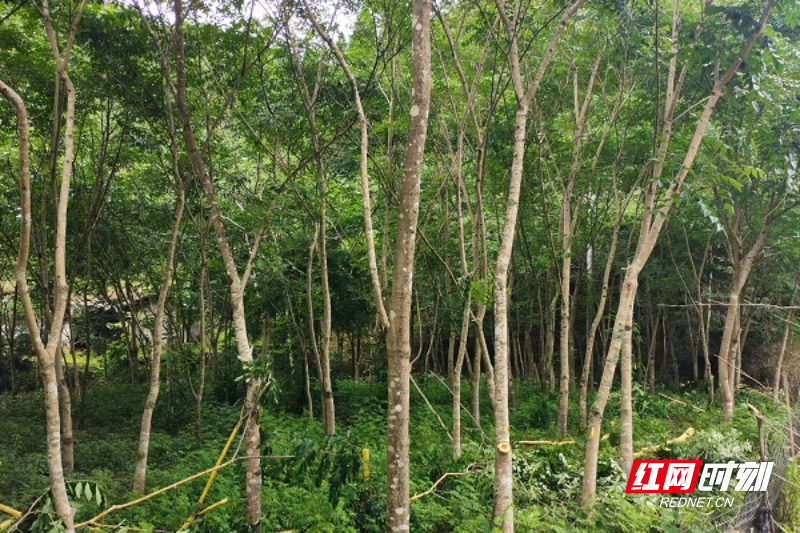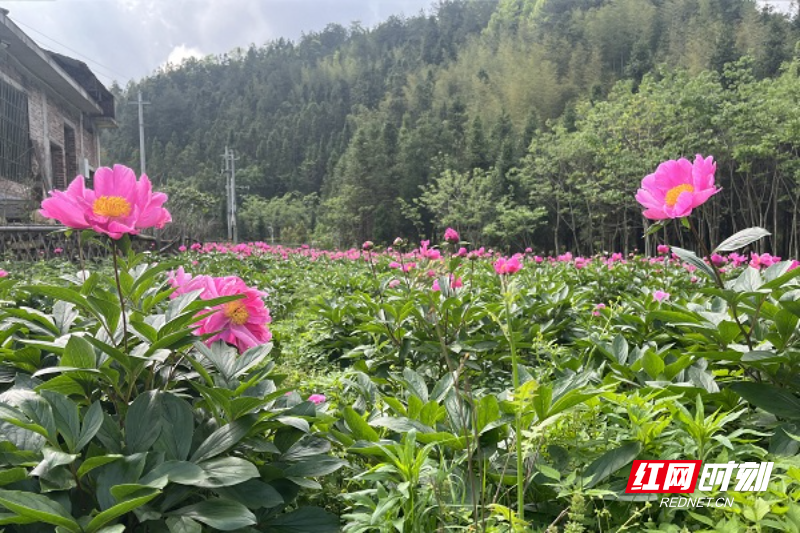Chinese medicinal materials boost villagers’ income
2025-04-06
“Chinese medicinal herbs such as Huangbai (phellodendron amurense) and Shichangpu (acorus gramineus) have low cost and wide market demand, and are easily managed. Huangbai can achieve more than 1,300 kilograms per mu (about 0.067 hectares), with 40 to 60 yuan per kilogram. The output value is nearly 80,000 yuan per mu (about 0.067 hectares), with a cost of less than 200 yuan,” said Luo Jianhuai, a large grower of Chinese medicinal materials, who was busy plowing the land to plant Shichangpu at the planting base in Luojia Village, Qingshan Township, Guidong County.
He said that he has planted more than 1,200 mu (80 hectares) of Huangbai this year, and plans to plant another 30 mu (2 hectares) of Shichangpu. It’s expected to achieve the yield of 1,000 kilograms per mu (about 0.067 hectares) and to increase the net income by 1.9 million yuan, with 70 yuan per kilogram.

Qingshan Township is located in the deep mountains, with abundant ecological resources. It has made efforts to develop the traditional Chinese medicinal material industry and guided villagers to plant Huangbai, Gangmei, and Shichangpu through policy support, technical guidance, and innovative grassroots governance models so as to promote the large-scale development of the Chinese medicinal material industry.
Chen Zhigang, Party secretary of Caidong Village, is also the leader of the traditional Chinese medicinal material industry in the village. This year, he plans to expand more than 100 mu (about 6.67 hectares) of traditional Chinese medicinal materials such as Huangbai.
He said that the traditional Chinese medicinal material industry is thriving in Caidong Village, with more than 8,000 mu (about 533.33 hectares) in the village and an average of 40 mu (about 2.67 hectares) per household. A 1,500-mu (100 hectares) base has been established for Huangbai, Houpu, and Gangmei in the village. In 2024, Huangbai generated an income of 4.8 million yuan, with per capita income increasing by 7,000 yuan.
Meanwhile, Chen Zhigang has reached out to a company in Guangdong province. The company plans to transfer more than 400 mu (about 26.67 hectares) of land with the investment of more than 1 million yuan to plant Chinese medicinal herbs such as Huangbai, Gangmei, Shichangpu, and Houpu.
Qingshan Township advocates for the three-dimensional integrated development of forestry and traditional Chinese medicinal materials. Different traditional Chinese medicinal materials have been planted under trees, by creeks, and around houses, which has beautified villages, green the ecology, and boosted villagers’ income.
As of the end of 2024, there are more than 26,000 mu (about 1,733.33 hectares) of traditional Chinese medicinal materials in Qingshan Township, with nearly 5,000 mu (about 333.33 hectares) of newly added traditional Chinese medicinal materials. The township has achieved the annual comprehensive output value of about 130 million yuan and the per capita planting area of about 6 mu (0.4 hectares), with an average income increase of about 29,000 yuan.

Qingshan Township has implemented the three-level chief system to promote the healthy development of rural economy and culture.
Chiefs will help villagers solve technical bottlenecks encountered during the process of planting traditional Chinese medicinal materials. It they can’t solve them, they will ask the township for help. The township government will invite technicians to conduct technical training in the township. Besides, 20 agricultural technicians are organized to release knowledge and skills manuals, conduct technical training, and guide scientific fertilization, watering, and pest control in fields.
Luo Jianhuai, a chief, has transferred 1,200 mu (80 hectares) of land to build a demonstration base for traditional Chinese medicinal material planting. He has also led more than 10 households to plant traditional Chinese medicinal materials.
“Thanks to technical guidance and training, the yield of Gangmei has increased by nearly 50% per mu (about 0.067 hectares) and my annual income has increased by 15,000 yuan,” said a villager from Caidong Village.
“It’s time to plant Chinese medicinal materials. Free seedlings, along with technical guidance as well as purchase at a guaranteed price, are offered.” Luo Jianhuai posted a new message in the “WeChat group” of the village. In addition, the village also posted the industrial incentive policy in the group.
“Qingshan Township will preserve the Chinese fir forests while developing the traditional Chinese medicinal material industry. We will boost villagers’ income through the ‘green’ industry,” Song Huhai, Party secretary of Qingshan Township.
Chinese source: rednet




